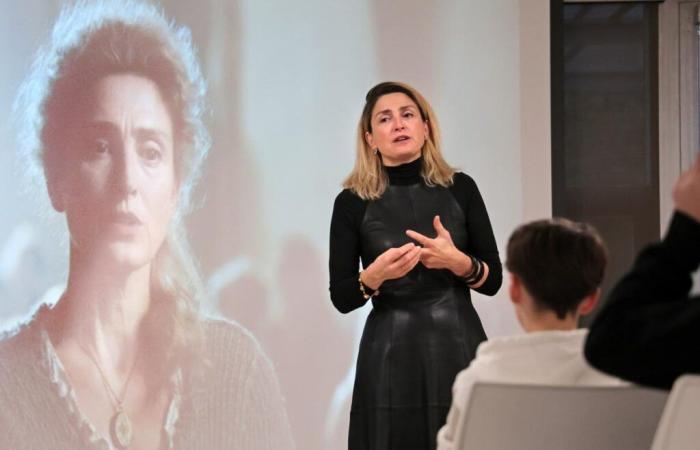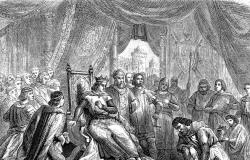
LThe poster for the film “Olympe, a woman in the Revolution” sits in the middle of the meeting room. On the chairs, students from the fourth and third sections of adapted general and vocational education (Segpa) take their places. Everyone takes out a sheet of paper from their backpack on which they have written a few questions.
It's a bit of a special day at Lubet-Barbon college in Saint-Pierre-du-Mont. This Wednesday, November 20, 2024, Julie Gayet and Mathieu Busson are present to discuss this fiction that they co-directed. And which should be broadcast on the France Télévisions channels around March 8, 2025, for International Women's Rights Day.
The two friends took the challenge of telling the life of Olympe de Gouges in ninety minutes. 18th century woman of letters and playwrighte century, she is for Mathieu Busson “one of the most symbolic women of the French Revolution”. She remained in posterity for her Declaration of the Rights of Women and Citizens and for her fight for the civil rights of women and the abolition of slavery. Julie Gayet sees in her a “humanist before being a feminist” character, she who “fought for the people, for others”.
Resonate with current events
The actress hesitated for a long time before playing the playwright. After a long period of documentation work, to the point of “knowing her life by heart”, she managed “to imagine what she was”. Even if research work on this figure of the time remains recent. “The first biography of Olympe de Gouges dates back to 1981. When I was in college, we didn’t know her,” she recalls.
In the audience, questions abound to learn more about the creative process of a film. Nineteen days of filming and 60 people were necessary to produce “Olympe, a woman in the Revolution”. For Julie Gayet and Mathieu Busson, this fiction allows them to highlight a “point of view”, “battles” which resonate with current events. “When we observe the barbaric treatment reserved for women in countries like Iran or Afghanistan, it is mind-blowing. These are things that should no longer exist,” denounces the director.
“When we observe the barbaric treatment reserved for women in countries like Iran or Afghanistan, it is mind-blowing”
The scene of the forced marriage of Olympe de Gouges, then aged 17, with Louis-Yves Aubry, raised questions among adolescents. Clément Barrier, history and geography teacher, noted during the preparation of this meeting the motivation of the students when tackling this theme of the place of women. “We had to explain to them that at that time, being a widow was an opportunity. She even claimed to be a libertine later in her life. Moreover, some students are rather conservative (laughs). »
For Julie Gayet and Mathieu Busson, this fiction allows them to highlight a “point of view”, “battles” which resonate with current events.
Philippe Salvat / SO
The guillotine also provoked many fantasies in the audience. Even more so when they learned that this execution instrument belonged to a collector. “He’s a psychopath,” one of the young people can’t hold back. “Making period films requires preparation a long time in advance. The sets and costumes require a lot of thought. Everything is complicated,” continues Mathieu Busson. Even if they allowed themselves to change a name or a date for this film. “We are not historians,” he clarifies.
Collective 50/50
Throughout the discussions, the topics covered were plural: salary inequalities, parity (the two actors are part of the 50/50 collective, an association whose aim is to promote equality between women and men), endometriosis or even sexist and sexual violence. “It’s not women who are fragile, it’s their rights. We are not born a feminist: we become one,” reaffirmed Julie Gayet in front of the audience of adolescents.
Behind the importance of telling this story, the directors stressed that Olympe de Gouges was “not afraid to die for her ideas” and that she “had transmitted something” without “the fight being over.” “. Condemned by the revolutionary tribunal in 1793, she took advantage of her last moments to send a letter to her son, Pierre Aubry de Gouges. Before her execution on the scaffold, she will pronounce her last words: “Children of the fatherland, you will avenge my death. »The students of Lubet-Barbon college can now continue this fight.





